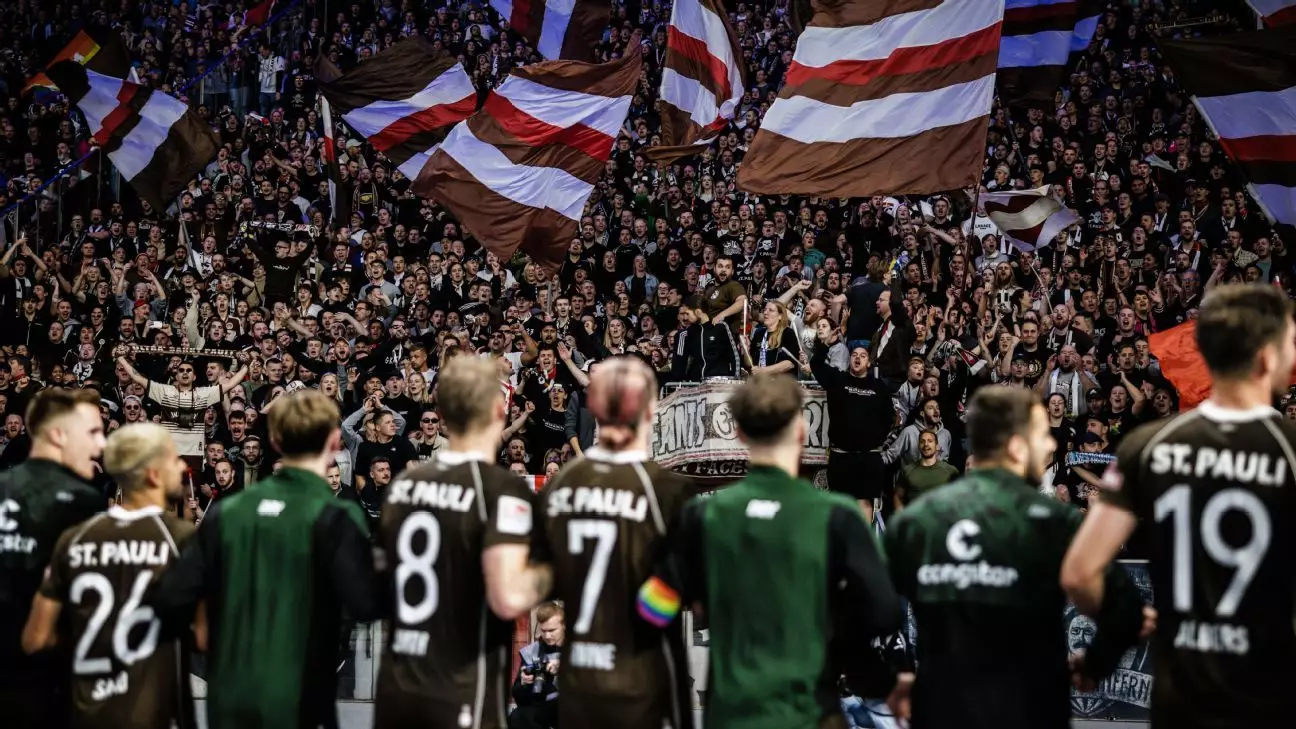In contemporary sport, the separation of athletics and politics is frequently championed, especially in Anglophone cultures where such intersections are seen as contentious. Yet the fabric of German football, particularly that of FC St. Pauli, serves as a powerful counter-narrative. St. Pauli embodies not just the spirit of the game but endorses a philosophy of inclusion and activism that reflects the struggles and aspirations of its local community in Hamburg. This small club, known affectionately as the Kiezkicker, represents a growing trend where the essence of football transcends mere competition to embrace social accountability and communal identity.
St. Pauli’s political ethos is deeply ingrained in the club’s identity. Established as an alternative to the commercialization that has claimed many football clubs, St. Pauli took root in a cultural milieu synonymous with punk music, social advocacy, and a quest for equality. Emerging from the vibrant Reeperbahn district during the 1980s, the club grew as a beacon for underrepresented voices and social movements. Fans of the club weren’t merely bystanders; they became advocates for various causes including homelessness, anti-fascism, and LGBTQ+ rights, seamlessly intertwining social justice with sporting culture.
The club’s iconic imagery, most notably the skull and crossbones symbol, epitomizes its rebellious spirit. This emblem evolved from a chance encounter with local punk subculture, signifying the community’s rejection of both societal and sporting norms dictated by corporate entities. The transformation of the Millerntor stadium into a festive, inclusive venue is a testament to St. Pauli’s organic growth amid the rigid frameworks of modern football, and its atmosphere continues to attract a diverse and vibrant audience.
Attending a St. Pauli match is less about the outcome on the pitch and more about the immersive experience that defines this unique club. The energy of the supporters, the pulsating music, and the fervent chants create an unparalleled atmosphere. While many clubs have succumbed to corporate monotony, St. Pauli’s matches resemble a carnival, a festive gathering where music and sport coexist. The collective passion of nearly 30,000 fans contributes to a celebratory environment that feels distinctively different from mainstream commercial football.
On the pitch, though the club faces challenges, it has managed to maintain a spirited presence in the Bundesliga. The tactical configurations of head coach Alexander Blessin symbolize more than athletic strategy; they embody the resilience and indomitable spirit of the players, especially figures like Jackson Irvine. Irvine’s connections with the local culture and his willingness to engage with fans reflect a palpable bond between the players and the community, contrasting sharply with the aloofness often portrayed by elite athletes.
In an exciting and innovative move, St. Pauli has introduced the Genossenschaftsmodell (cooperative model) that redefines fan ownership in the club. Here, supporters can invest in their club whilst maintaining democratic voting rights—an essential notion in an age dominated by affluent investors wielding disproportionate influence. This model fosters a sense of belonging and accountability, ensuring that decisions made reflect the wants and needs of the local community rather than distant, profit-driven shareholders.
The cooperative concept encourages collective investment not solely in the football team but also in the community. Such efforts promise to alleviate financial burdens while enabling fans to have a say in the future of the Millerntor stadium. The democratic principle of “one person, one vote” marks a radical shift towards a model of football ownership where commercial principles take a backseat to community welfare and sustainability.
As the Kiezkicker embarks on its latest season, the anticipation surrounding their matches, particularly against historic rivals like Bayern Munich, brings in both local and global attention. For many fans, this rivalry transcends the pitch, acting as a reminder of the club’s significant achievements despite financial constraints. The journey through challenges evokes a spirited kinship between clubs and supporters, uniting them against rampant corporate football’s impersonal ethos.
St. Pauli’s convergence of sport and community activism stands as an inspiring example of how football can navigate through turbulent societal waters and emerge fortified. As the club launches its cooperative model officially, it not only positions itself as a pioneer of community-based football administration but also reaffirms the intrinsic belief that sport should be a catalyst for social change.
Ultimately, the atmosphere surrounding St. Pauli’s matches is a microcosm of a larger movement aiming to reclaim football from the grips of commercialization. In the face of adversity, the Kiezkicker embodies the unwavering spirit of a community determined to champion its values on and off the pitch, ensuring that football remains, at its core, a game for all.

